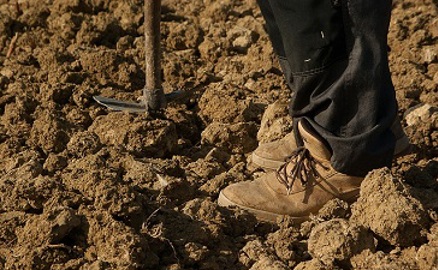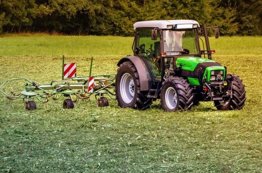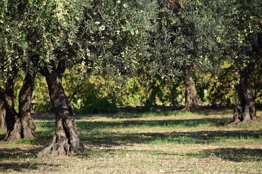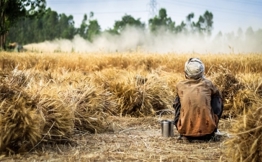The mutual responsibility aspect of shemitah

The responsibility of consumers vis-a-vis the farmers during the shemitah year. Which fruits and vegetables are preferable to consume: yivul nochri (grown by a non-Jew), heter mechirah, or otzar beit din.
The dilemmas posed by the shemitah year[1]
The shemitah year, and the various halachic solutions that have arisen during the years, pose certain thorny dilemmas. On the one hand, we want to strengthen those Jewish farmers who choose to observe the mitzvah of shemitah in the most halachically preferable mode (otzar beit din) instead of relying on the heter mechirah. On the other hand, we have to understand the position of those farmers who simply can’t adopt the preferable otzar beit din system, and have to rely on heter mechirah.
For the Israeli consumer, the “simplest” solution is to buy fruits and vegetables from abroad. It is often even cheaper. But is this the right thing to do? Today, only less than 2% of Israelis work in agriculture. Is it fair to ignore their great economic distress during the shemitah year?
Sensitivity of Chazal to farmer's difficulties during the shemitah year
It seems that Chazal also faced these kinds of thorny issues in the past. For example, the Mishnah in Ta’anit [2] states:
“When it stops raining for more than forty days, we call for a fast day [that is a sign of drought].” This means that the religious leaders would organize their communities to pray for rain. However, according to the Talmud Yerushalmi,[3], “Just as we call for a fast day during the other six years of the shemitah cycle, so we do so during the seventh year, on behalf of the livelihood of others.”
The obvious question is: Since we presume that the Jews do not need rain in a shemitah year (because they are not involved in agriculture), then why should they fast and pray for “others”? Who are these “others”?
The Yerushalmi brings two answers. Some say that although the Jews don’t need the rainfall, they pray for the non-Jewish farmers because when there is a drought, everyone suffers and starves.
Zeira, however, says the reason is, “for the sustenance of the suspicious ones.” In other words: for Jews who work the land during the shemitah year (thus violating it), yet we still fast on their behalf!
We cannot compare someone who violates a halachah out of spite to one who does so because he is very poor. Because this mitzvah is such a difficult one, its violators were not called “shemitah violators” like “Sabbath violators,” but only “suspected of the shevi’it,” or: “one who is suspected of ignoring the laws of the shemitah year.”
How could this be?
Zeira follows the opinion of Rabbi Yehudah HaNasi (Rebbi). Rebbi, in his time, wanted to circumvent shemitah because of the difficulties faced by the Jewish farmers in making a living in Eretz Yisrael at the time. Rebbi believed that shemitah was a rabbinic ordinance in his time.
The Yerushalmi tells us the following story on this theme: One day, someone suspected of violating shemitah was taken to Rebbi to beit din, to face punishment. But Rebbi refused to punish him, evidently because the man was very poor.
Let us not forget that the real heroes of the shemitah year today are the farmers and not the consumers. The latter can manage very well by eating produce grown by non-Jews. It is the farmers who are supposed to abandon their fields and not earn a living during the shemitah year, and this is much harder. Therefore, we should be more accepting of those farmers who rely on heter mechirah even though it is problematic heter, and buy from them. In this way we carry out the mitzvah d’oraita, "וחי אחיך עמך", “Your brother shall live with you”, and not to prefer buying yevul nochri grown by non-Jews.
The connection between the public “avodah shebalev” (prayer) and working the land
When we face problems with making a living, we are expected to make natural, human efforts to succeed (hishtadlut). We also pray for success but do not rely on miracles. In other words: Just as it is forbidden to rely only on our own efforts, the same is true with relying only on prayer – we need both. The same is true with regard to agriculture in Eretz Yisrael. The Torah tells us[4]:
“If, then, you obey the commandments that I enjoin upon you this day, loving the Lord your God and serving Him with all your heart and soul. I will grant the rain for your land in season, the early rain and the late. You shall gather in your new grain and wine and oil.”
The reason for the heter to pray and even fast to “assist” non-Jewish farmers in Eretz Yisrael or those under suspect for violating shemitah is the partnership or mutual responsibility we have for one another, even for sinners, via our prayers. Even when we have the option of importing fruits from abroad, we pray for the success of the crops growing in Israel. Agricultural prosperity in Eretz Yisrael is not only an economic need but a Godly expression of the connection between the People of Israel and the Land of Israel. By virtue of the partnership of the farmers (a minority) who work the land, with the urban public (majority) that prays for its farmers – all of them are partners in hishtadlut for the great mitzvah that is equivalent to all the mitzvot in the Torah (Sifri, Devarim 17:11), namely, cultivating the holy fruits of Eretz Yisrael.
According to the Yerushalmi (as mentioned above) we pray for rain even during shemitah, “because of the livelihood of others.” We can interpret “others” to refer to non-Jews who work the land in Israel today, or those Jews who feel compelled to work the land during shemitah due to poverty. And this is all because there is a great need for Eretz Yisrael to bloom and blossom and not remain barren.
If there is a basis to pray even for people who are suspected of violating the shemitah, then we should support Jewish farmers even when they need to use halachic lenient opinions as heter mechirah.
Rabbi Avraham Kahana Shapira on heter mechirah
Rabbi Shapira, Ashkenazi Chief Rabbi of Israel from 1983 to 1993, preferred produce grown during the shemitah year according to the heter mechirah to yevul nochri, crops grown by non-Jews:
“Know, my friend, that that when you think you are adopting the halachically stringent position by buying tomatoes and vegetables grown by a non-Jew … You are not stingent, and you are not helping those farmers who refrain from agricultural work during the seventh year. In fact, you have no connection to the mitzvah of land remission, although you don’t realize that … The ones who deserve praise are those Jews who own land and refrain from working during shemitah ... and those who purchase shemitah produce from the otzar beit din... When you buy more produce from the Arabs that does not mean that you are observing the mitzvah of shemitah, and you are doing nothing to encourage people to observe shemitah. You have no right to arrogantly state that one who fills himself up with the produce of Arabs is carrying out Rabbi Kook’s great desire for the upsurge of shemitah observant Jews in the Eretz Yisrael.
What is Otzar Ha’aretz?
It is chain that gives preference to produce that have shemitah sanctity (kedushat shvi’it), as part of otzar beit din to produce that grew under heter mechirah.
What is preferable: produce from the otzar beit din or heter mechirah?
Rav Shapira is in favor of the otzar beit din system in which the farmers continue to work the land, but only engage in the activities permitted by halachah during the shemitah year, and consumers buy their produce. The farmers are paid for serving as agents of the rabbinical court (beit din), and the consumers assisting those farmers who observe shemitah.
Buying otzar beit din produce strengthens shemitah observers and encourages additional farmers to choose this path as well.
Both Rav Kook in his generation, and Rav Shapira in his, also strengthened the heter mechirah so that it could be employed by those who needed it.
On the other hand, they continued to strongly encourage as many farmers as possible to observe shemitah properly, without employing leniencies meant for extenuating circumstances. They even created a fund to assist those farmers who observed shemitah. They did not view this as a contradiction, but instead, they had different halachic positions with the same goal: strengthening Jewish agriculture in Eretz Yisrael and helping Jewish farmers avoid violating the shemitah.
The difference between the lenient halachic opinions employed by otzar beit din and those used by heter mechirah:
Unfortunately, we have been witness in recent years to a phenomenon in which some of the rabbinic courts have neglected the otzar beit din solution. This is for several reasons: On the one hand, many ultra-Orthodox rabbinical courts prefer yevul nochri “with absolutely no shemitah issues.” On the other hand, there are rabbis who feel that since the otzar beit din approach also calls for leniencies in working the earth and selling the produce, it has no advantage to heter mechirah. Therefore, they prefer the convenience of purchasing heter mechirah produce and leave the transition to keeping shemitah in its ideal form to the era of Moshiach.
Those rabbis who prefer the heter mechirah view the issue from the narrow perspective of leniencies and stringencies and do not take the whole picture into consideration. We view the heter mechirah as a tool to bypass shemitah, to be used sparingly and prevent the farmers from sinning inadvertently during the shemitah year.
On the other hand, the otzar beit din track is based on observing the shemitah in its ideal form, even though we do have to rely on several leniencies in the process.
Since most of the poskim hold that shemitah, during our era, is derabbanan, the halachah follows the lenient position.
The connection between the generation of redemption and the mitzvah of shemitah
Our generation has been privileged to live in a time of atchalta degeulah, thus we are obligated to try to encourage the revival of the shemitah mitzvah properly. We must make efforts to observe shemitah to usher in the redemption. Chazal reveal that in the future, a bat kol will hover over the tallest mountains and proclaim, “Everyone who has acted for the sake of God, come now to receive your reward.”[5]
The Rambam is a preeminent posek in the realm of the laws of redemption, and this is what he wrote in SeferHilchotMelachim:[6]
“In the future, the King Mashiach will arise and renew the Davidic dynasty, restoring it to its initial sovereignty. He will rebuild the Sacred [Temple] and gather in the dispersed remnant of Israel. Then, in his days, all the statutes will be reinstituted as in former times. We will offer sacrifices and observe the Sabbatical and Jubilee years according to all their particulars set forth in the Torah …
One should not presume that the Messianic king must work miracles and wonders, bring about new phenomena in the world, resurrect the dead, or perform other similar deeds. This is definitely not true…"
The Rambam tells us that during the days of the Mashiach, the world will continue as usual, without miracles. As an example, the Rambam devoted much space to recount the story of Rabbi Akiva’s support for Ben Koziva, in anticipation of the latter becoming the Messiah, even though Bar Koziva never wrought miracles or supernatural wonders. The Rambam learns from here that even our future redemption will come naturally, by a human being who will fight our enemies and win. This person will restore diplomatic independence to the Jewish People and, ultimately, reinstate the Torah laws among the nation.
In other words: In our generation, the generation of redemption, we need to try to observe the shemitah year properly but also naturally. We cannot wait for miracles.
The advantage of otzar beit din
Today, when the agricultural burden falls on the shoulders of a very small percentage of the population, it seems that the only way to restore the mitzvah of shemitah properly is through otzar beit din. This means that since a small group of farmers must provide produce for everyone in the State of Israel, we must employ lenient halachic opinions regarding the sale of shemitah fruits. For example, this shemitah produce is more expensive than other types of produce, even though the otzar beit din permits prices that only cover the actual costs. (The high prices are the result of the much higher expenses involved in growing this produce.) Nevertheless, this system is halachically preferable to mechirah and certainly to yevul nochri.
The halachic leniencies employed for heter mechirah serve to uproot the mitzvah itself – letting the land rest. Instead, the leneincies employed by otzar beit din are connected only to a secondary prohibition (namely, selling the produce), which is a minor problem.
The farmers as agents of Am Yisrael
Thus we understand that responsibility for carrying out the mitzvah of shemitah falls on the entire Israeli population, not only the farmers. The Ramban addresses this issue in the context of the mitzvah of settling the Land of Israel: “We were commanded to inherit the land that God gave to our forefathers, Avraham, Yitzchak and Yaakov; and not leave it in the hands of other nations, nor to wasteland.”[7]
The first part of the mitzvah; “and not leave it in the hands of other nations” is not a goal that individual members of the Jewish People can carry out; only an army, made up of individual fighters, can achieve this. But the second part of this mitzvah, “nor to wasteland,” means that it is not enough to conquer the land; afterward, we must make the wasteland bloom. This part of the mitzvah our farmers carry out: the farmers make the fields bloom and paint the land green on behalf of the general public, and as an agent of the public.
Parting words
People who live in urban settings can come together prior to the shemitah year and commit themselves (by paying a down payment) to consume produce from an otzar beit din; the produce is grown only by farmers who observe shemitah.
Otzar Ha’aretz, guided by Rabbi Yaakov Ariel, is a successful application of the otzar beit din concept.
As the shemitah year approaches, I call on all the consumers to commit themselves to eat the produce of Otzar Ha’aretz, and to encourage the grocers to continue to provide shemitah produce.
[1] Due to the length of the article and its extensive use of complicated halachic concepts, we were forced to shorten and summarize the words of Rabbi Van Dike; thus we did not always use the exact translation. I assume responsibility for mistakes in the translation (Rabbi Moshe Bloom).
See here for the full article in Hebrew.
[2] Ta’anit 3:1.
[3] Yerushalmi, Ta’anit 3:1.
[4] Devarim 11:13-14.
[5] Vayikra Raba 27:2.
[6] Hilchot Melachim 11:1-3.
[7] Ramban, addition to the Rambam's Sefer Hamitzvot, addition aseh 4




